- Home
- Paulo Coelho
The Winner Stands Alone Page 24
The Winner Stands Alone Read online
Page 24
An important figure in the world of filmmaking has been killed, so who's going to be interested in the death of an insignificant young woman? They'll all reach the same conclusion as he did at the start of the investigation--that she died of a drug overdose. Problem solved.
To go back to the murdered film director; perhaps she isn't as important a figure as he thinks; if she was, the police commissioner would be calling him now on his mobile phone. The facts are as follows: a smartly dressed man of about forty, with slightly graying hair, had been seen talking to her as they watched the sunset, the two of them observed by a young man hiding nearby. After sticking a blade into her with all the precision of a surgeon, he had walked slowly away, and was now mingling with hundreds and thousands of other people, many of whom quite possibly fitted his description.
He turns off the siren for a moment and phones his deputy, who had remained at the scene of the crime and who is probably currently being interrogated by journalists rather than himself doing the interrogating. Savoy asks him to tell the journalists, whose hasty conclusions so often get them into trouble, that he is "almost certain" it was a crime of passion.
"Don't say we're certain, just say that the circumstances may indicate this, given that they were sitting close to each other like a courting couple. It clearly wasn't a robbery or a revenge killing, but possibly a dramatic settling of personal scores.
"Be careful not to lie; your words are being recorded and may be used in evidence against you."
"But why do I need to say that?"
"Because that is what the circumstances indicate. And the sooner we give them something to chew on, the better."
"They're asking about the weapon used."
"Tell them that everything indicates it was a knife, as the witness said."
"But he's not sure."
"If even the witness doesn't know what he saw, what else can you say apart from 'everything indicates that, etc. etc.'? Frighten the lad; tell him his words are being recorded by the journalists and could be used against him later on."
He hangs up before his subordinate starts asking awkward questions.
"Everything indicates" that it was a crime of passion, even though the victim had only just arrived in Cannes from the United States, even though she was staying at a hotel alone, even though, from what they have been able to glean, she had only attended one rather trivial meeting in the morning, at the Marche du Film next to the Palais des Congres. The journalists, however, would not have access to that information.
And there is something even more important that no one else on his team knows, indeed, that no one else in the world knows but him.
The victim had been at the hospital. He and she had talked a little and then he'd sent her away--to her death.
He turns on the siren again, so that the deafening noise can drive away any feeling of guilt. After all, he wasn't the one who stuck the knife in her.
He could, of course, think: "She was obviously there in the waiting room because she had some connection with the drug mafia and was just checking that the murder had been a success." That was "logical," and if he told his superior about that chance encounter, an investigation along those lines would immediately be launched. It might even be true; she had been killed using a very sophisticated method, as had the Hollywood film distributor. They were both Americans. They had both been killed with sharp implements. It all seemed to indicate that the same group was behind the killings, and that there really was a connection between them.
Perhaps he's wrong, and there is no serial killer on the loose. The young woman found dead on the bench, apparently asphyxiated by an experienced killer, might have met up the previous night with someone from the group who had come to see the film distributor. Perhaps she was also peddling drugs along with the craftwork she used to sell.
Imagine the scene: a group of foreigners arrive to settle accounts. In one of Cannes' many bars, the local dealer introduces one of them to the pretty girl with the dark eyebrows, who, he says, works with them. They end up going to bed together, but the foreigner, feeling strangely relaxed on European soil, drinks more than he should; the drink loosens his tongue and he says more than he should too. The next morning, he realizes his mistake and asks the professional hit man--every gang has one--to sort things out.
It all fits so perfectly that it must be true.
It all fits so perfectly that it makes no sense at all. It just wasn't credible that a cocaine cartel would have decided to hold such a meeting in a town which, during the Film Festival, is heaving with extra police brought in from all over the country, with private bodyguards, with security guards hired for the various parties, and with detectives charged with keeping a round-the-clock watch on the priceless jewels being worn in the streets and elsewhere.
Although if that were true, it would be equally good for his career. A settling of accounts between mafia men would attract as much publicity as a serial killer.
HE CAN RELAX; WHATEVER THE truth of the matter, he will finally acquire the reputation he has always felt he deserved.
He turns off the siren. It has taken him half an hour to drive along the motorway and across an invisible barrier into another country, and he's only minutes from his destination. His mind, however, is mulling over what are, in theory, forbidden thoughts.
Three murders in one day. His prayers are with the families of the victims, as the politicians always say. And he knows that the state pays him to maintain order and not to jump up and down with glee when it's disrupted in such a violent manner. Right now, the commissioner will be pacing his office, conscious that he now has two problems to solve: finding the killer (or killers, because he may not be convinced by Savoy's theory) and keeping the press at bay. Everyone is very worried; other police stations in the region have been alerted and an Identi-Kit picture of the murderer sent via the Internet to police cars in the area. A politician may even have had his well-deserved rest interrupted because the chief of police believed the matter to be so very delicate that he felt it necessary to pass responsibility on to someone higher up the chain of command.
The politician is unlikely to take the bait, telling the chief of police to ensure that the town returns to normal as soon as possible because "millions or hundreds of millions of euros depend on it." He doesn't want to get involved; he has more important issues to resolve, like which wine to serve that night to a visiting foreign delegation.
"Am I on the right path?" Savoy asks himself.
The forbidden thoughts return. He feels happy. This is the high point of a career spent filling in forms and dealing with trivia. It had never occurred to him that such a situation would produce in him this state of euphoria--he can, at last, be a real detective, the man with a theory that goes against all logic, and who will end up being given a medal because he was the first to see what no one else could. He won't confess this to anyone, not even to his wife, who would be horrified and assume that he must have temporarily lost his reason under the strain of working on such a dangerous case.
"I'm happy. I'm excited," he thinks.
His prayers might well be with the families of the dead, but his heart, after many years of inertia, is returning to the world of the living.
SAVOY HAD IMAGINED A VAST library full of dusty books, piles of magazines, a desk strewn with papers, but the office is, in fact, painted entirely in immaculate white and furnished with a few tasteful lamps, a comfortable armchair, and a glass table on which sits a large computer screen and nothing else, just a wireless keyboard and a small notepad with an expensive Montegrappa pen lying on it.
"Wipe that smile off your face and at least try to look a little concerned," says the man with the white beard, who is dressed, despite the heat, in tweed jacket, tie, and tailored trousers, an outfit not at all in keeping with the decor or with the subject under discussion.
"What do you mean, sir?"
"I know how you're feeling. This is the biggest case of your career, in a town where n
ormally nothing happens. I went through the same inner turmoil when I lived and worked in Penycae, Swansea. And it was thanks to a very similar case that I got transferred to Scotland Yard."
"My dream is to work in Paris," thinks Savoy, but he says nothing. The man invites him to take a seat.
"I hope you, too, get a chance to realize your professional dream. Anyway, nice to meet you. I'm Stanley Morris."
Savoy decides to change the subject.
"The commissioner is afraid that the press will start speculating about there being a serial killer on the loose."
"They can speculate all they like, it's a free country. It's the kind of thing that sells newspapers and brings a little excitement into the dull lives of pensioners who will watch all the media for any new tidbit on the subject with a mixture of fear and certainty that it will never happen to them."
"I hope you've received a detailed description of the victims. Does the evidence so far suggest to you a serial killer, or are we dealing here with some sort of revenge killing on the part of drug cartels?"
"Yes, I got the descriptions. By the way, they wanted to send them to me by fax, for heaven's sake. How old-fashioned! I asked them to send the information by e-mail, and do you know what they said? 'We don't usually do that.' Imagine! One of the best-equipped police forces in the world still relying entirely on a fax machine!"
Savoy shifts rather impatiently in his chair. He isn't here to discuss the pros and cons of modern technology.
"Let's get down to business," says Dr. Morris, who had been quite a celebrity at Scotland Yard, but had decided to retire to the South of France and was possibly as glad as Savoy to have a break from routine--in Morris's case one that now revolved around reading, concerts, charity teas, and suppers.
"Since this is the first time I've met such a case, could you perhaps tell me whether or not you agree with my theory that there is only one killer, just so that I know where I stand."
Dr. Morris explains that in theory, yes, he's right: three murders with certain common characteristics would normally be enough to indicate a serial killer. And such murders were usually confined to one geographical area (in this case, the town of Cannes), and...
"Whereas, a mass murderer..."
Dr. Morris interrupts him and asks him not to misuse terminology. Mass murderers are terrorists or immature adolescents who go into a school or a snack bar and shoot everyone in sight, and who are then either shot dead by the police or commit suicide. They have a preference for guns and bombs that will cause the maximum amount of damage in a short space of time, usually two to three minutes at most. Such people don't care about the consequences of their actions because they know exactly how it will end.
"In the collective unconscious, the concept of the mass murderer is easier to take on board because he's clearly 'mentally unbalanced' and therefore easily distinguishable from 'us.' The serial murderer, on the other hand, touches on something far more complicated--the destructive instinct we all carry within us."
He pauses.
"Have you read Dr. Jekyll and Mr. Hyde by Robert Louis Stevenson?"
Savoy explains that he has so much work that he has little time for reading. Morris's gaze grows icy.
"And do you think I don't have work to do?"
"No, no, I didn't mean that. Listen, Dr. Morris, I'm here on an urgent mission. I'm not interested in discussing technology or literature. I just want to know what conclusions you drew from the reports."
"I'm sorry, but I'm afraid we can't, in this instance, avoid literature. The Strange Case of Dr. Jekyll and Mr. Hyde is the story of an apparently normal individual, Dr. Jekyll, who, in seeking to explore his own violent impulses, discovers a way of transforming himself periodically into a creature entirely without morality, Mr. Hyde. We all have those impulses, Inspector. A serial killer doesn't just threaten our physical safety, he threatens our sanity too. Because whether we like it or not, we all carry around in us a great destructive power and have all, at some point, wondered what it would be like to give free rein to that most repressed of feelings--the desire to take someone else's life.
"There are many reasons for this: wanting to put the world to rights, to get revenge for something that happened in our childhood, to vent one's suppressed hatred of society, but, whether consciously or unconsciously, everyone has felt that desire at one time or another, even if only in childhood."
Another meaningful silence.
"I imagine that, regardless of your chosen profession, you must yourself have experienced this feeling. Tormenting a cat perhaps or torturing some perfectly harmless insect."
It's Savoy's turn now to give Morris an icy stare and say nothing. Morris, however, interprets his silence as consent and continues talking in the same easy, superior tone:
"Don't expect to find some visibly unbalanced person with wild hair and a hate-filled leer on his face. If you ever do have time to read--although I know you're a busy man--I would recommend a book by Hannah Arendt, Eichmann in Jerusalem. There she analyzes the trial of one of the worst serial killers in history. Obviously, Eichmann needed help to carry out the gigantic task he was given: the purification of the human race. Just a moment."
He goes over to his computer. He knows that the man with him wants results, but that simply isn't possible. He needs to educate him and prepare him for the difficult days ahead.
"Here it is. Arendt made a detailed analysis of the trial of Adolf Eichmann, who was responsible for the extermination of six million Jews in Nazi Germany. She says that the half a dozen psychiatrists charged with examining him had all concluded that he was normal. His psychological profile and his attitude toward wife, children, mother, and father were all within the social parameters one expects in a responsible man. Arendt goes on: 'The trouble with Eichmann was precisely that so many were like him, and that the many were neither perverted nor sadistic, that they were, and still are, terribly and terrifyingly normal. From the viewpoint of our legal institutions and of our moral standards of judgment, this normality was much more terrifying than all the atrocities put together...'"
Now he could get down to business.
"I notice from the autopsies that there was no sign of sexual abuse..."
"Dr. Morris, I have a problem to solve and I need to do so quickly. I want to know whether or not we're dealing with a serial killer. No one could possibly rape a man in the middle of a lunch party or a girl on a public bench in broad daylight."
He might as well have said nothing. Morris ignores him completely and continues.
"...which is a common feature in many serial killers. Some have what you might call 'humane' motives. Nurses who kill terminally ill patients, people who murder beggars in the street, social workers who feel so sorry for certain pensioners or disabled people that they reach the conclusion they'd be better off in the next life--there was one such case in California just recently. There are also people bent on putting society to rights, and in those cases, the victims tend to be prostitutes."
"Dr. Morris, I didn't come here..."
This time Morris raises his voice slightly.
"And I didn't invite you. I'm doing you a favor. If you want to leave, please do so, but if you're going to stay, please stop interrupting my argument every two minutes. In order to catch someone, we have to understand the way he thinks."
"So you do believe we're dealing with a serial killer?"
"I haven't finished yet."
Savoy controls himself. After all, why was he in such a hurry? Wouldn't it be more fun to let the press tie itself in knots and then present them with the solution?
"Please go on."
Morris moves the monitor so that Savoy can see more clearly. On the large screen is an engraving, possibly from the nineteenth century.
"This is the most famous of all serial killers: Jack the Ripper. He was active in London in the second half of 1888, and was responsible for killing five or possibly seven women in public and semi-public places. He would rip open th
eir bellies and disembowel them. He was never found. He became a legend, and even today, there are still people trying to uncover his real identity."
The image on the screen changes to reveal what looks like something from an astrological chart.
"This is the signature of the Zodiac Killer. He's known to have killed five couples in California over a period of ten months, mostly courting couples who had parked their cars in isolated spots. He used to send letters to the police bearing this symbol, which is rather like a Celtic cross. No one has yet managed to identify him.
"Researchers believe that both Jack the Ripper and the Zodiac Killer were people who were trying to restore moral order and decency to their particular areas. They had, if you like, a mission to fulfill. And contrary to what the press would have us believe with the terrifying nicknames they invent, like the Boston Strangler and the Child Killer of Toulouse, these were ordinary folk who would get together with their neighbors at weekends and who worked hard to earn a living. None of them ever benefited financially from their criminal acts."
The conversation is beginning to interest Savoy.
"So it could be anyone who came to Cannes to attend the Film Festival..."
"Yes, having first made a conscious decision to create an atmosphere of terror for some completely absurd reason, for example 'to overthrow the dictatorship of fashion' or 'to put a stop to the making of films that provoke violence.' The press will come up with some bloodcurdling soubriquet for him and start chasing various leads. Crimes that have nothing to do with the killer will start being attributed to him. Panic will ensue and only come to an end if by chance--and I repeat, by chance--the killer is caught. These killers are often only active for a short period of time and then disappear completely, having left their mark on history. They may perhaps write a diary that will be discovered after their death, but that's all."
Savoy has stopped looking at his watch. His phone rings, but he decides not to answer. The subject is far more complicated than he thought.
"So you agree with me?"

 The Alchemist
The Alchemist Maktub
Maktub Like the Flowing River
Like the Flowing River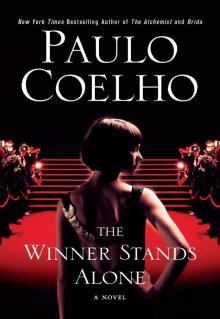 The Winner Stands Alone
The Winner Stands Alone The Spy
The Spy By the River Piedra I Sat Down and Wept: A Novel of Forgiveness
By the River Piedra I Sat Down and Wept: A Novel of Forgiveness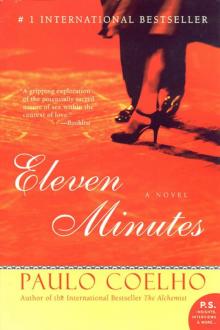 Eleven Minutes
Eleven Minutes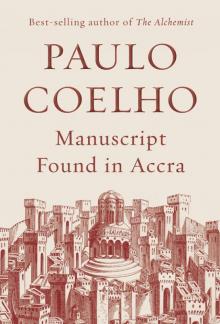 Manuscript Found in Accra
Manuscript Found in Accra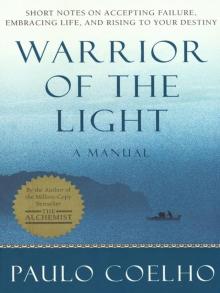 Warrior of the Light
Warrior of the Light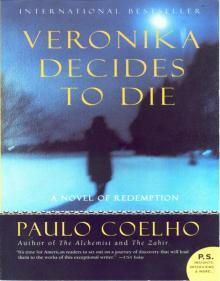 Veronika Decides to Die: A Novel of Redemption
Veronika Decides to Die: A Novel of Redemption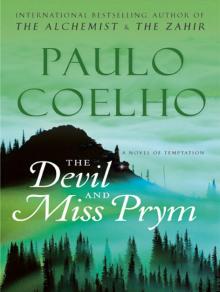 The Devil and Miss Prym: A Novel of Temptation
The Devil and Miss Prym: A Novel of Temptation The Valkyries: An Encounter With Angels
The Valkyries: An Encounter With Angels Brida: A Novel
Brida: A Novel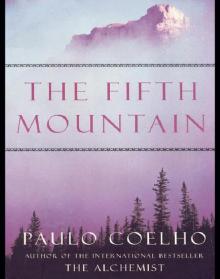 Fifth Mountain: A Novel
Fifth Mountain: A Novel Adultery
Adultery Inspirations
Inspirations The Archer
The Archer The Witch of Portobello
The Witch of Portobello The Pilgrimage
The Pilgrimage The Zahir
The Zahir Brida
Brida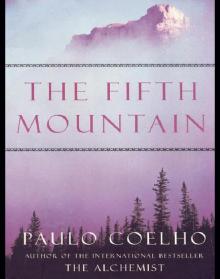 The Fifth Mountain
The Fifth Mountain Like the Flowing River: Thoughts and Reflections
Like the Flowing River: Thoughts and Reflections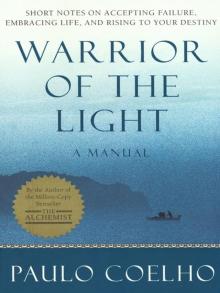 Manual of the Warrior of Light
Manual of the Warrior of Light By The River Piedra I Sat Down & Wept
By The River Piedra I Sat Down & Wept The Supreme Gift
The Supreme Gift Aleph
Aleph Hippie
Hippie Witch of Portobello
Witch of Portobello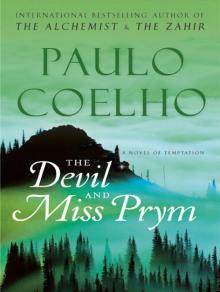 The Devil and Miss Prym
The Devil and Miss Prym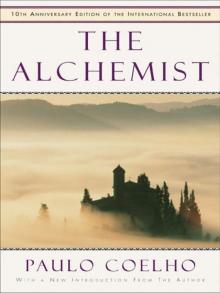 The Alchemist - 10th Anniversary Edition
The Alchemist - 10th Anniversary Edition The Valkyries
The Valkyries